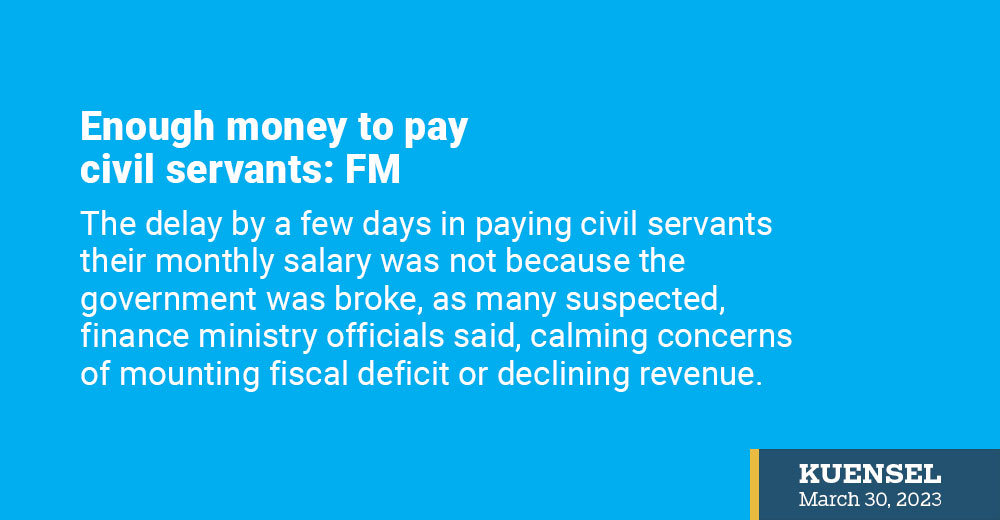Delay in salary disbursement leads to rumour of govt. not having money
Rinzin Wangchuk
The delay by a few days in paying civil servants their monthly salary was not because the government was broke, as many suspected, finance ministry officials said, calming concerns of mounting fiscal deficit or declining revenue.
Refuting the rumors, Finance Minister Namgay Tshering said that there is no shortage of funds to pay salaries of the civil and public servants. “Delaying the disbursement of monthly salary was not because of shortage of budget but to streamline financial discipline and internal arrangement for the budgetary agencies,” he said.
On December 22 last year, the Ministry of Finance (MoF) notified all the budgetary bodies and relevant stakeholders that the salary in e-PEMS will be disbursed within the last three working days of every month. This according to the notice was to maintain uniform timeline for disbursement of salary, ensure timely remittances and to help budgetary bodies and MoF plan or in effective cash forecasting and management.
Acting Finance Secretary Leki Wangmo said that the reason for disbursing salary in the last three working days of the month is to put in financial discipline and make it uniform within the budgetary bodies.
She said that civil servants cannot get their salary in the middle of the month. “People working in the private sector get their salary on the last day of the month,” she said.
In the past, agencies used to disburse salaries more than a week before the end of the month. However, according to some civil servants, they were not aware of such notification issued by the finance ministry that they would be receiving their salary on 28th or 29th of every month. “That is why we were wondering why our salary was withheld until month end,” a civil servant said.
An official from the ministry said that one has to work and earn one month to get his or her salary. “It is not appropriate to disburse salary one week or 10 days before the month end,” he said. “To get your salary, you have to work a full month.”
Notwithstanding the notification, some civil servants received their salaries on 26 and 27 March. However, many received their March salary yesterday as per the ministry’s notification.
The MoF spends around Nu 1.4 billion (B) every month for all public servants receiving salary in e-PEMS from the government’s coffer. As of December 31, 2022, Bhutan had 30,194 regular civil servants and 4,853 on contract.
The MoF with the view to strengthen the public financial management developed a digital electronic Public Expenditure Management System (e-PEMS) and and Global Interchange for Financial Transaction (GIFT) payment system.
With ePEMS and GIFT, transactions of public finances such as salaries, pensions, benefits, and allowances are processed through cheques and do not require to record manually.
Concerns over loan deduction
Some civil servants expressed their concern on the late disbursement of their salary as it may impact on their loan deduction. For instance, according to a public servant who is a loan account holder, the National Pension and Provident Fund (NPPF) deducts loans from an individual’s account from 26th day of every month.
Another loan account holder of NPPF said that if the salary is not deposited before 25th of the month, the concerned agency may impose interest for not meeting repayment schedule. Some financial institutions deduct loans after the salary is deposited.
An official from NPPF clarified that the NPPF deducts loan installments from 26th day of the month. “If the salary is not deposited in the individual’s account, we deduct from their balance amount,” he said. “However, the outstanding due will have to be paid on the 1st day of every month.”
A senior NPPF official said that the financial institutions deduct loans from an individual’s salary based on the standing instruction (SI) agreed between the bank and the members with loan from NPPF. “I am not sure the exact date the bank deducts but they deduct if there is an agreed SI in place,” he said.
Meanwhile, according to the second quarter budget report from October to December 2022, the fiscal deficit was recorded at Nu 22.9B. The 12th Five Year plan projected fiscal deficit is Nu 29B. Kuensel sources say that the fiscal deficit could have already crossed Nu 30B in the third quarter because of decrease in domestic revenue and increased unplanned spending.
Additional reporting
by Dechen Dolkar


